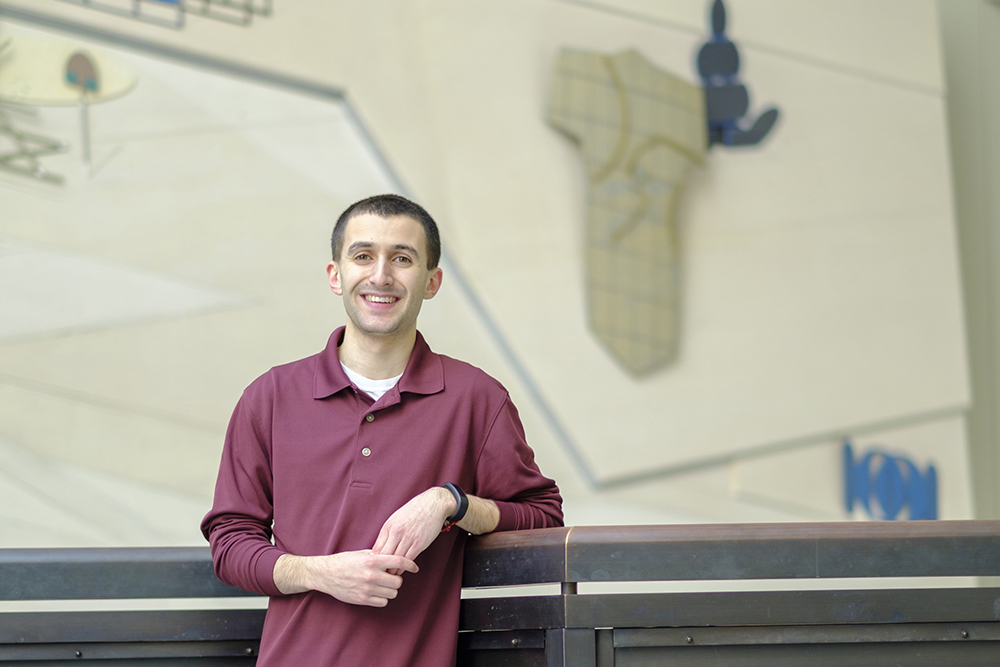Six UConn undergraduates, two current graduate students, and four alumni have won National Science Foundation Graduate Research Fellowships.
The oldest graduate fellowship of its kind, the NSF-GRFP recognizes and supports outstanding graduate students in NSF-supported STEM fields who are pursuing research-based master’s and doctoral degrees at accredited U.S. institutions. In addition to a three-year annual stipend of $34,000, plus another $12,000 paid to the student’s home institution, fellows have access to a wide range of professional development opportunities over the course of their graduate careers.
The NSF-GRFP are highly competitive. UConn’s successful candidates are among 2,000 winners selected from 12,000 applicants, and the number of applicants has been restricted in recent years.
“The NSF-GRFP is arguably the premier federally funded fellowship for aspiring scientists,” says Vin Moscardelli, director of UConn’s Office of National Scholarships & Fellowships. “The applications are long and involved, and only the best and brightest seniors and early career graduate students are encouraged to apply.
“Forty-two NSF Graduate Research Fellows have gone on to win Nobel Prizes,” Moscardelli adds, “and the program counts accomplished scientists like Google co-founder Sergey Brin, Freakonomics co-author Steven Levitt, and U.S. Secretary of Energy Steven Chu among its alumni.”
This year’s UConn winners are:
Colby Buehler ’18 (ENG) of Canton, Connecticut, has earned a bachelor’s degree in chemical engineering, with a minor in environmental engineering. An honors student, he was an undergraduate researcher in the Computational Atmospheric Chemistry and Exposure Lab, and received an IDEA grant to conduct summer research on pesticide drift from conventional to organic farmland. He hopes to pursue an academic career studying the environmental chemistry of the atmosphere.
Sydney Carr ’18 (CLAS) of Hamden, Connecticut, is graduating with a BA in political science with a minor in Africana studies, and plans to earn a Ph.D. in political science and public policy at the University of Michigan. During her time at UConn, she participated in UConn’s Honors Congressional Internship program in the office of Rosa DeLauro, held a research internship at the Ralph Bunche Summer Institute at Duke University in 2017, and served as president of UConn’s chapter of the National Council of Negro Women. Carr competed in the social science division of the fellowship competition.
Vince Pistritto ’18 (CLAS, SFA), from Woodbury, Connecticut, is graduating with bachelor’s degrees in both chemistry and music. He plans to earn a Ph.D. in chemistry, specializing in chemical catalysis. He also plays clarinet as a member of the UConn Wind Ensemble and Symphony Orchestra.
Daniel Wackelin ’18 (ENG) of Farmington, Connecticut, has earned a bachelor’s degree in chemical engineering in just three years. While at UConn, he has been president of the American Institute of Chemical Engineers UConn Chapter, and vice president of ChemE Car, an annual college competition for students to design small-scale automobiles that are powered by a chemical energy source and do not release any pollution or waste. In the summer of 2017, he spent four months as an REU summer researcher at Rensselaer Polytechnic Institute. He now plans to pursue a Ph.D. in chemical engineering.
In addition to winning an NSF Graduate Research Fellowship, Hope Whitelock ’18 (CLAS) was a finalist for the Gates-Cambridge Scholarship. A talented physicist, she’s also a singer-songwriter and an artist; donates her hair for wigs for chemo patients; rescues thoroughbred race horses; and runs the Women in Physics club. She plans to pursue a Ph.D. in condensed matter physics.
In addition to UConn’s undergraduate winners, two current UConn graduate students have won National Science Foundation Graduate Research Fellowships: Jessica Anne Martin, who is studying macromolecular, supramolecular, and nanochemistry, and Sahil Luthra, who is studying cognitive neuroscience.
Kyle Drake ’17 (CLAS) matriculated at UConn in fall 2014, but graduated early, last December, with a bachelor’s degree in physiology and neurobiology. He is now a first-year graduate student in the Kanadia Lab in UConn’s physiology and neurobiology department, working on a Ph.D. in developmental biology. As an undergraduate, he co-hosted a podcast interviewing faculty from all disciplines to highlight the varied types of research and scholarship underway at UConn.
And four additional recent UConn alumni who are now pursuing graduate studies elsewhere also earned NSF Graduate Research Fellowships: Nicole Renee Gay, who is studying genomics at Stanford University; Emily Rose Post, cultural anthropology at the University of Utah; Kelsey Louise Reeves, environmental engineering at the University of Colorado at Boulder; and Aubrey Anne Ladd Wank, neuropsychology at the University of Arizona.
The Office of National Scholarships & Fellowships is a resource for high-achieving students interested in learning more about the NSF Graduate Research Fellowship and other scholarships and fellowships that support graduate study in all fields. For more information about STEM fellowships specifically, contact Rowena Grainger, STEM fellowships adviser.



